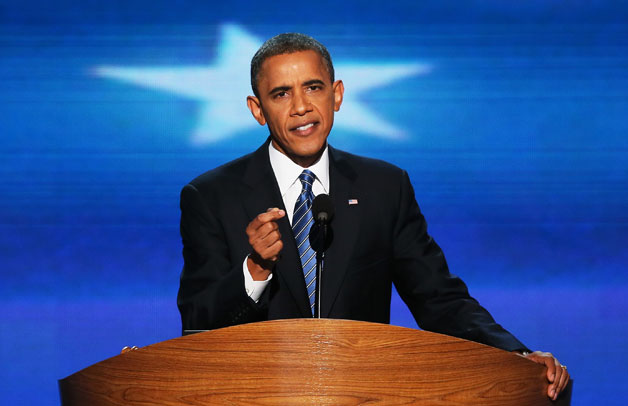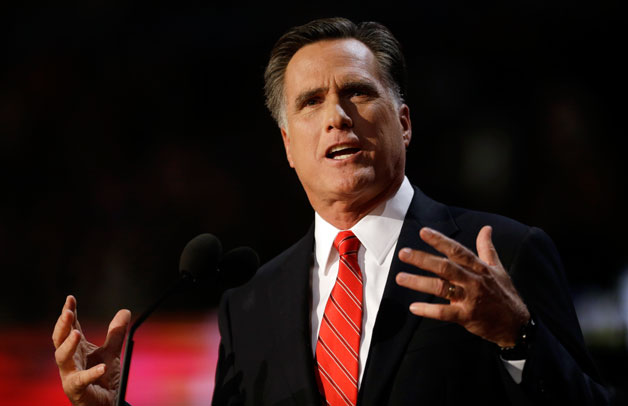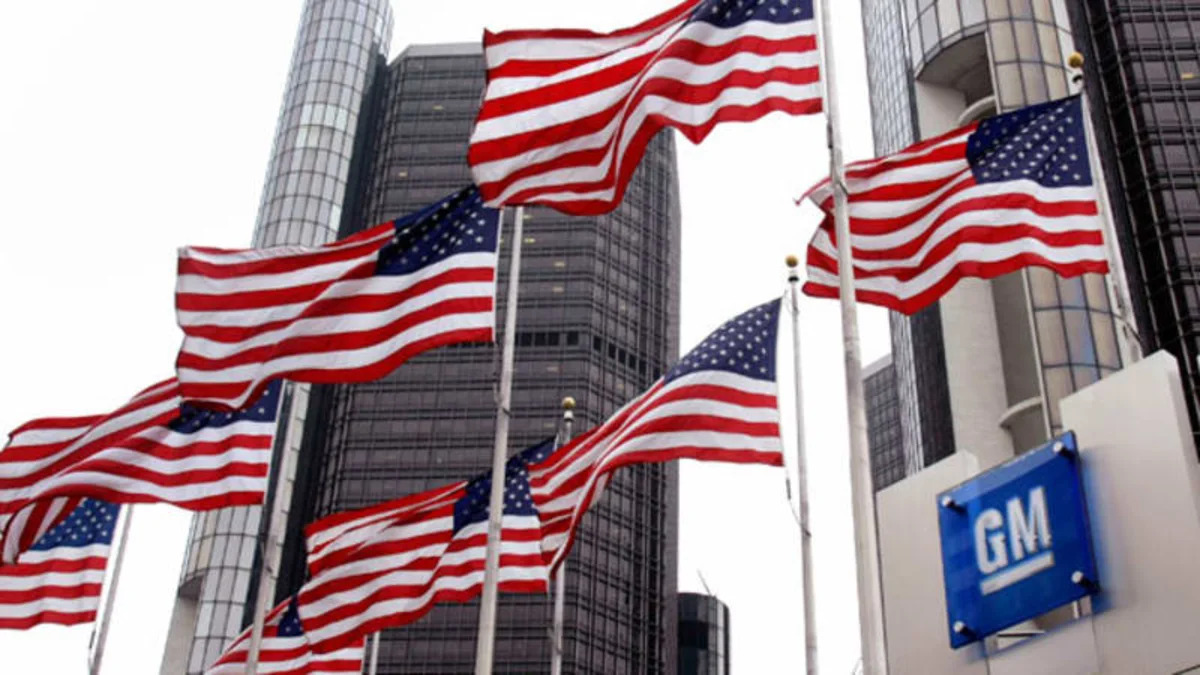The Role Autos Are Playing In Deciding Our Next President
He was elected to the U.S. Senate in 1942 and served a dozen years during which his most memorable act was introducing the bill that added the words, "under God" into the Pledge of Allegiance. But to both his friends and foes alike, Homer S. Ferguson had a more important agenda that earned him the sobriquet "the Senator from General Motors."
As the recent Supreme Court decision commonly referred to as "Citizens United" only underscored, money has always played a part in politics. And for much of the 20th Century, few had the sort of money to invest in influencing government like the auto industry, especially giant GM.
But something curious has happened in the world of horsepower politics over the last few years. General Motors, in particular, has become as much a topic of debate as the force influencing the discussion. And where you stand on the subject could very well influence how you vote in this November's presidential election.
 Paul A. Eisenstein is Publisher of TheDetroitBureau.com and a 30-year veteran of the automotive beat. His editorials bring his unique perspective and deep understanding of the auto world to Autoblog readers on a regular basis.
Paul A. Eisenstein is Publisher of TheDetroitBureau.com and a 30-year veteran of the automotive beat. His editorials bring his unique perspective and deep understanding of the auto world to Autoblog readers on a regular basis.
The 2009 auto industry bailout, at $85 billion, was relatively modest compared to the money thrown at the collapsing banking industry, but has nonetheless become a hot-button issue as the White House campaign heads into its final two months. While there was nary a mention of the TARP loans to financial giants like CitiCorp and Bank of America during the recent political conventions it seemed like barely a speaker could go by without mentioning the auto bailout.
"The entire auto industry, and the lives of over one million hard-working Americans, teetered on the edge of collapse, and with it, the whole manufacturing sector. We looked everywhere for help," declared Jennifer Granholm during the final day of this week's Democratic convention.
Governor of Michigan during the bankruptcy of GM and Chrysler, Granholm's voice rose to a shout as she proclaimed that, "Almost nobody had the guts to help us - not the banks, not the private investors and not Bain Capital. Then, in 2009, the cavalry arrived: our new president, Barack Obama."

The message, of course, was quite different the week before, when the Republicans took to the stage in Tampa to officially name Mitt Romney their presidential nominee. Despite – or perhaps because – of his long ties to Michigan, where his father once ran tiny American Motors, the GOP nominee has consistently opposed the bailout.
He wrote a series of op-ed pieces, including one in The New York Times, in 2008 opposing the use of government money, and during the long primary slog, this past year, forcefully repeated his position. During one appearance near Chrysler headquarters, Romney asserted that the multi-billion-dollar rescues for Chrysler and General Motors "wasted billions of dollars initially," insisting, "It was the wrong way to go. I said from the very beginning they should go through a managed bankruptcy process."
Neutral observers – and there are a few – find an irony to the debate, not only because the bigger TARP loans have largely been ignored during the campaign but also because the bailout process actually was begun by President Barack Obama's predecessor, Republican George W. Bush. But the outgoing Commander-in-Chief authorized only enough money to forestall the GM and Chrysler bankruptcies, passing the final move to the new president.
Further politicizing the rescue was the attempt by GM and Chrysler to dump thousands of dealers as they emerged from the bankruptcy process.

In the weeks ahead, virtually every bit of economic news is likely to play out far more loudly than might be typical when the presidency isn't at stake. And perhaps no story will get more play than the third-quarter earnings report General Motors has now scheduled for October 31, less than a week before the election. Could this prove to be the sort of October Surprise that has sank or resurrected so many presidential bids in the past?
A strong report could add currency to Obama's claims to have rescued the auto industry and saved countless jobs. Weak numbers would certainly buoy the Romney bid, adding ammunition to those who felt the bailout was nothing but a sweetheart deal that went against fundamental American principles and wasted taxpayer dollars.
Part of the irony is that GM has traditional been counted in the Republican court – though its lobbyists have usually been carefully to parse campaign cash out to both sides of the aisle – and the maker's CEO Dan Akerson has a long history with the GOP, including a role as a major fundraiser for George W. Bush.
But, as the old adage goes, politics makes for strange bedfellows, and at no time has it been more apparent than during the 2012 presidential campaign. Who knows what the late Senator Ferguson might have done.
He was elected to the U.S. Senate in 1942 and served a dozen years during which his most memorable act was introducing the bill that added the words, "under God" into the Pledge of Allegiance. But to both his friends and foes alike, Homer S. Ferguson had a more important agenda that earned him the sobriquet "the Senator from General Motors."
As the recent Supreme Court decision commonly referred to as "Citizens United" only underscored, money has always played a part in politics. And for much of the 20th Century, few had the sort of money to invest in influencing government like the auto industry, especially giant GM.
But something curious has happened in the world of horsepower politics over the last few years. General Motors, in particular, has become as much a topic of debate as the force influencing the discussion. And where you stand on the subject could very well influence how you vote in this November's presidential election.
 Paul A. Eisenstein is Publisher of TheDetroitBureau.com and a 30-year veteran of the automotive beat. His editorials bring his unique perspective and deep understanding of the auto world to Autoblog readers on a regular basis.
Paul A. Eisenstein is Publisher of TheDetroitBureau.com and a 30-year veteran of the automotive beat. His editorials bring his unique perspective and deep understanding of the auto world to Autoblog readers on a regular basis.
The 2009 auto industry bailout, at $85 billion, was relatively modest compared to the money thrown at the collapsing banking industry, but has nonetheless become a hot-button issue as the White House campaign heads into its final two months. While there was nary a mention of the TARP loans to financial giants like CitiCorp and Bank of America during the recent political conventions it seemed like barely a speaker could go by without mentioning the auto bailout.
"The entire auto industry, and the lives of over one million hard-working Americans, teetered on the edge of collapse, and with it, the whole manufacturing sector. We looked everywhere for help," declared Jennifer Granholm during the final day of this week's Democratic convention.
Governor of Michigan during the bankruptcy of GM and Chrysler, Granholm's voice rose to a shout as she proclaimed that, "Almost nobody had the guts to help us - not the banks, not the private investors and not Bain Capital. Then, in 2009, the cavalry arrived: our new president, Barack Obama."

The message, of course, was quite different the week before, when the Republicans took to the stage in Tampa to officially name Mitt Romney their presidential nominee. Despite – or perhaps because – of his long ties to Michigan, where his father once ran tiny American Motors, the GOP nominee has consistently opposed the bailout.
He wrote a series of op-ed pieces, including one in The New York Times, in 2008 opposing the use of government money, and during the long primary slog, this past year, forcefully repeated his position. During one appearance near Chrysler headquarters, Romney asserted that the multi-billion-dollar rescues for Chrysler and General Motors "wasted billions of dollars initially," insisting, "It was the wrong way to go. I said from the very beginning they should go through a managed bankruptcy process."
Neutral observers – and there are a few – find an irony to the debate, not only because the bigger TARP loans have largely been ignored during the campaign but also because the bailout process actually was begun by President Barack Obama's predecessor, Republican George W. Bush. But the outgoing Commander-in-Chief authorized only enough money to forestall the GM and Chrysler bankruptcies, passing the final move to the new president.
Further politicizing the rescue was the attempt by GM and Chrysler to dump thousands of dealers as they emerged from the bankruptcy process.

In the weeks ahead, virtually every bit of economic news is likely to play out far more loudly than might be typical when the presidency isn't at stake. And perhaps no story will get more play than the third-quarter earnings report General Motors has now scheduled for October 31, less than a week before the election. Could this prove to be the sort of October Surprise that has sank or resurrected so many presidential bids in the past?
A strong report could add currency to Obama's claims to have rescued the auto industry and saved countless jobs. Weak numbers would certainly buoy the Romney bid, adding ammunition to those who felt the bailout was nothing but a sweetheart deal that went against fundamental American principles and wasted taxpayer dollars.
Part of the irony is that GM has traditional been counted in the Republican court – though its lobbyists have usually been carefully to parse campaign cash out to both sides of the aisle – and the maker's CEO Dan Akerson has a long history with the GOP, including a role as a major fundraiser for George W. Bush.
But, as the old adage goes, politics makes for strange bedfellows, and at no time has it been more apparent than during the 2012 presidential campaign. Who knows what the late Senator Ferguson might have done.


Sign in to post
Please sign in to leave a comment.
Continue